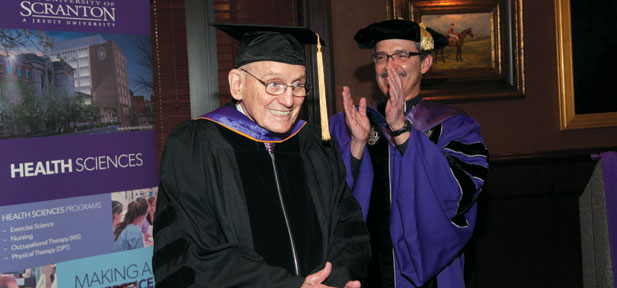James M. Kane, Sr., M.D. has always considered himself a University of Scranton alumnus. The only thing missing was his diploma.
In 1946, while just eight credits shy of earning his bachelor’s degree, Dr. Kane transferred to medical school at Loyola University Chicago. During and immediately after World War II, he explained, it was not uncommon for medical schools to accept select students early in order to ensure an adequate number of trained doctors.
After graduating from medical school, Dr. Kane served as a flight surgeon in the U.S. Navy, earned another degree (this time a master’s in pathology from Northwestern University), raised a family and pursued an extremely successful career in the Chicago area. But he never forgot his time at Scranton.
Dr. Kane and his late wife, Gloria, raised four children and have 11 grandchildren. Together, they instilled a commitment to education that has been carried on through the generations. “The truth is, I felt indebted to the school all my adult life,” Dr. Kane said. “Where I am and how I got there was without question because of my Scranton education.”
One piece, however, was missing. Dr. Kane’s daughter, Elizabeth, teased her father one day, saying, ‘Dad, how is it that you went to medical school but have no bachelor’s degree?’, he said. When Scranton leaders heard the story, they knew it was something that had to change.
On Nov. 23 in Rosemont, Illinois, University President Kevin P. Quinn, S.J., conferred a bachelor of science degree to the retired surgeon in a ceremony attended by family and close friends. His alumnus status, though never in question, was now official.
“Fr. Quinn said, ‘The University of Scranton is honored to have you as a graduate and I am privileged to serve as the president bestowing your degree,’” Dr. Kane said. “I thought it was very nice. Ten of my grandchildren were there, among others, including very dear friends. I really enjoyed it.”
Dr. Kane, a 2012 recipient of the University’s Frank O’Hara Award, held several leadership positions during his 45 years as a surgeon at four Chicago-area hospitals, including chief of surgery at three locations. A pioneer in bariatric medicine, he assisted in the development of various procedures in bariatric surgery that led the way to laparoscopic gastric bypass. Though he also performed other surgeries, he became well known for his work with the morbidly obese, thanks to a special patient: Agnes Belushi, the mother of John and James Belushi.
“Agnes was invited to Las Vegas to see her son perform, and she said she couldn’t get on the plane [because of her weight] so she wasn’t going to go,” Dr. Kane said. “I said, “Agnes, I see your problem, and I can help.’”
Belushi became one of Dr. Kane’s first bariatric surgery patients. The rest, he said, is history. “It worked very well,” Dr. Kane said. “The entertainment world is very small, and word spread. One day, Phil Donahue wanted her on his talk show. She said, ‘I’ll come if you can convince Dr. Kane to come too.’ So I went to the show. You could not believe the response.”
He returned to the office and found his phone ringing off the hook, including calls from as far away as Guam. “We kept a list and called back as best we could. It was thousands of calls, literally. After that, there was no question if I was going to do that surgery or not.”
His life as a prominent surgeon was very different from the one he’d envisioned for himself. He wasn’t even considering college at first, and was happy moving up the ladder as a manager for a chain of movie theaters. “My older and much wiser brother Bill ’43, a pre-med student at the University, was not exactly happy with my career choices,” said Dr. Kane. “To get Bill off my case, I agreed to enroll at The University of Scranton and promised to give it one week. Everything changed in my life that week!”
“The Jesuits were tremendously motivational, very friendly, and extremely influential in my education,” Dr. Kane said. “I blossomed at the University — the spark that [Richard J. Neu, S.J. and Robert H. Springer, S.J.] provided helped me with every important decision and is still with me today.”
Dr. Kane has maintained strong ties to Scranton over the years. He made a gift to name The William ’43 and James ’46 Kane classroom in the Loyola Science Center. Most recently, he gave a leadership gift of a million dollars to name The James M. Kane, M.D. ’46 Forum, a centerpiece of the center for rehabilitation education scheduled to open next summer.
“I choose to support the ongoing work of the University because the University was so generous to me. I could never begin to repay that debt of gratitude,” he said. “The knowledge that I received during those critical years shaped my future and was the gift that kept on giving.”




